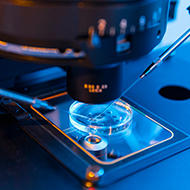Ky9™ canine antibody discovery platform complete

The work will enable the discovery of affordable, effective, and long-lasting companion animal medicines.
What is likely the largest successful transfer of genetic material from one mammalian species to another (not involving human DNA) has recently been carried out by scientists at PetMedix.
The transfer involved more than 4 Mbp of canine antibody DNA being transferred into the mouse genome. Genome engineering of this scale and sophistication was important to maintain immunoglobulin gene structure and integrity, reconfiguring the gene structure to the base pair, in order to replicate and exploit the mouse's natural immune system. The Ky9™ platform is then able to produce fully mature antibodies, selected in vivo for the highest quality, biological activity, stability and half-life.
This work will ultimately enable the discovery of affordable, highly-effective, and long-lasting companion animal medicines.
This work marks the end of the PetMedix Ky9™ platform, which is unequaled in its ability to be used to discover fully canine therapeutic antibodies. It is the only platform and technology in the world to be able to select fully canine therapeutic antibodies in vivo in that manner. A similarly hugely-important genome engineering undertaking was the basis of the technology that underpins Kymab's Kymouse antibody discovery platform.
A number of internal discovery programmes have already been assisted by the Ky9 platform at PetMedix, and the platform provides the foundation for the partnership between PetMedix and Boehringer Ingelheim Animal Health.
Additionally, PetMedix has also begun work on its new Felyne™ platform, which similarly to the Ky9 mouse, will attempt to enable the discovery of fully feline therapeutic antibodies, bringing novel therapies for the species.
Speaking on the completion of the Ky9™ platform, PetMedix CEO Dr Tom Weaver said: “Our goal at PetMedix is to bring the very best therapeutics to companion animal medicine. That we have reached this significant milestone is testament to the incredible team of nearly 40 scientists we have at PetMedix.
“For a company that is only 2 years old to have both completed a platform at this scale, and to have already used it to discover antibodies with best-in-class potential is down to the quality of both the science we are carrying out, and the people we have working on it.”



 The latest
The latest